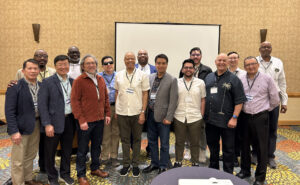
JACKSON, Tenn. (BP)–Postmodernism is a pervasive philosophy that has significantly skewed the thinking of many — especially today’s generation of students. Across our land, skepticism prevails as relativism runs rampant across university campuses, causing students to wander aimlessly throughout the pluralistic halls of doubt, chaos and uncertainty. The postmodern generation is characterized as one who distrusts authority, questions and tolerates anything, and dismisses absolute truth.
Such a picture causes many in the church to become pessimistic about reaching postmoderns with the Gospel. Why would they ever hear us? Why would they even give us and our Gospel the time of day? Certainly we and our 2,000-year-old Gospel are not modern enough for such postmoderns.
Christians should always think critically and creatively of how we can best communicate God’s message. While the issues of the day should always cause us to think about how we do what we do, some suggest that we consider postmodernism to the extent that we change what we are doing. With a desire to speak their language and meet them on their turf, some go so far as to say that when it comes to preaching to postmoderns, we should stop.
However, it is not the elimination of preaching that would help us better reach the postmoderns. It is the use of correct and biblical preaching that would help us in our efforts to reach them with the gospel.
P.T. Forsythe said, “… with preaching Christianity rises or falls.” Certainly this was in the mind of God when He sent the disciples preaching (Mark 3:14) and when He had Paul command Timothy to “preach and teach these principles” (1 Timothy 6:2b) and to “preach the Word” (2 Timothy 4:2). Without a doubt we realize the essential nature of preaching when we read that faith comes from hearing, and hearing by the word of Christ (Romans 10:17). And we would be amiss if we did not state that “for since, in the wisdom of God, the world through its wisdom did not come to know God, God was well-pleased through the foolishness of the message preached to save those who believe” (1 Corinthians 1:21). The necessity and gravity of preaching help us empathize with Paul when he cries out, “… for woe to me if I do not preach the gospel (1 Corinthians 9:16).
As we go about the business of preaching correctly, four characteristics should be pervasive in our preaching to postmoderns:
— The power of the Word. Our communication to postmoderns should be driven and empowered by Holy Scripture. Therein lies the power of God. God’s Word has always been central to His activity and it should be central to our preaching. Our knowledge of God and our communication of Him cannot be derived elsewhere. We speak because God has spoken, and it is His Word, not our words, that has power. While we should know our audience, we must be better students of our message and the great God for Whom we speak. Who are we today to tamper with the Word when God Himself has told us that it is “true” (Psalm 119:160) and “right” (Psalm 119:175) and that it is “living, active and powerful” (Hebrews 4:12)? Should we stop our preaching even when we know that the Word is like a “fire and a hammer” (Jeremiah 23:29) and that it is “inspired and profitable that the man of God may be adequate….”? (2 Timothy 3:16-17). Our confidence must flow from the power of the Word and not simply an understanding of the traits and trends of a certain society.
— An appreciation for our audience. Although changing, we must understand as John Stott states that preachers stand “between two worlds” — the world in which God delivered and crafted the message of truth and the world in which we live today. Certainly as Moses, Isaiah, Jeremiah, Jesus, Paul, the Apostles and others understood and connected with the audiences they addressed, so must we. A correct understanding of the makeup of our audience should not cause us to lower our voices and convictions, thereby diluting our proclamation to mere dialogue. Rather, it should cause us to rely more heavily on the power of God’s Word in such a way that we preach more prayerfully, more carefully and more biblically. We are not to turn a deaf ear to the voices of postmodernism. We should seek to know the framework of this thought system — not so we may stop our preaching, but so that we may improve our preaching.
— The supremacy of God. Regardless of creed or culture, people are longing to experience greatness. John Piper states that, “People are starving for the greatness of God.” While they may not admit it, students and postmoderns long for greatness. In my work with college students at Union University and across the country, I continuously am encouraged by students’ interest in the supremacy and sovereignty of God. In a world where nothing seems to be in control, a God who is supreme and sovereign over creation is waiting to be savored among postmoderns. I am convinced that while some may say postmoderns do not believe in absolute truth, they do. They want absolute truth all right — maybe they just haven’t heard anyone speak of God as if He were either absolute or truth! Perhaps postmoderns would believe in absolute truth if the preaching they heard came from men who preached like they too believed in absolute truth! A preacher whose life and words are ablaze with the supremacy of God cannot help but be heard!
— A passion for truth. God’s Word is truth, and His Word was ultimately revealed in Jesus who said, “I am the way, and the truth and the life….” (John 14:6). Later Jesus would pray, “Sanctify them in the truth; Thy word is truth” (John 17:17). He did not say that God’s Word is true or that it contains truth, but that it is truth. As we preach the truth, we realize that we are not heralding one proposition among many — a simply good or better way of life. Rather we are preaching The Way and The Truth. In the midst of a generation who is finding little about which to be passionate, we have the opportunity to stand and passionately deliver a message — the message of truth. While we must always be conversant with our culture, let us understand the essential nature and necessary place of preaching.
As Calvin said in his Institutes, “Let us not take it into our heads either to seek out God anywhere else than in his Sacred Word, or to speak anything that is not taken from that Word.”
With that in mind, let us preach, and preach well!
–30–
Todd Brady is minister to the university at Union University in Jackson, Tenn.
















